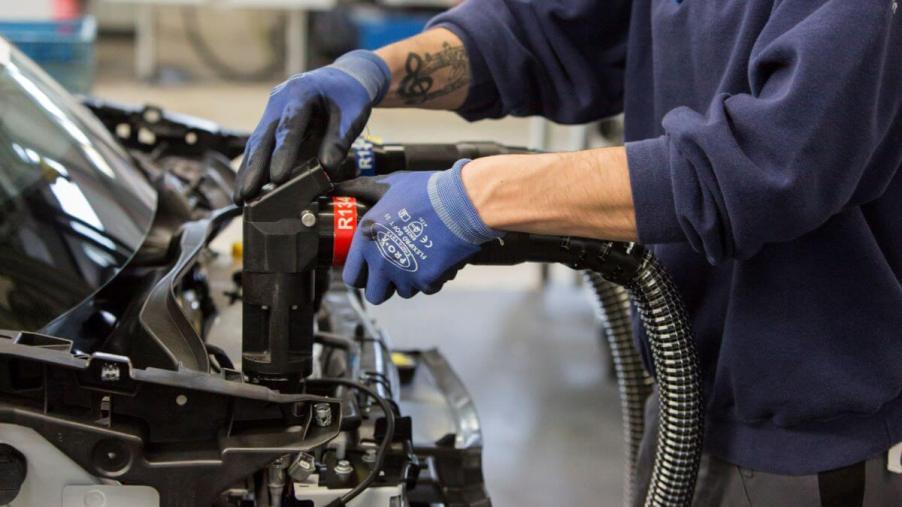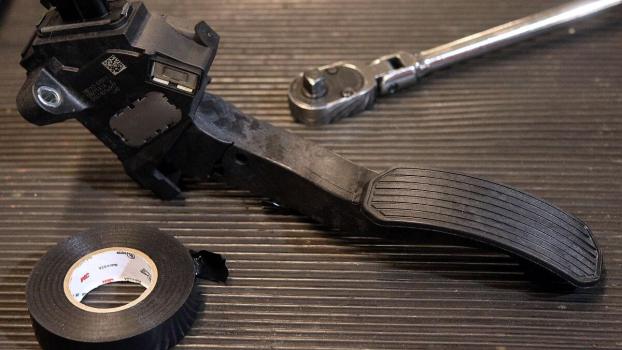
5 Factors That Reduce Brake Fluid Effectiveness and Performance
Proper maintenance is critical to keep your car’s braking system performance at the highest level. Typical brake system upkeep includes changing brake pads, resurfacing brake rotors, and topping off your brake fluid reservoir. However, the following five factors reduce the performance and effectiveness of your car’s brake fluid and could cause your brakes to fail prematurely.
Brake fluid’s role in your car’s braking system
We’ll focus on disc brake systems due to their popularity in modern vehicles, but brake fluid performs the same function in drum brake systems which you’ll still find on some cars’ rear brakes. MotorTrend summarizes a disc brake system as a caliper clamping onto a brake rotor spinning with the car’s wheel using hydraulic pressure supplied by the brake pedal. As the brake pedal applies pressure to the master cylinder containing the brake fluid reservoir, the brake fluid acts as a hydraulic fluid to transfer that pressure through brake lines to the calipers and brake cylinders in a drum brake system.
1. Water in the brake fluid
Tires Plus says that even fully sealed brake systems can absorb water vapor through microscopic holes in rubber hoses, leaky seals, and open reservoir caps. Additionally, Brakes to Go says the accumulated water lowers the brake fluid boiling point, reducing brake system effectiveness. Since brake fluid is hygroscopic and absorbs moisture from the air, changing your brake fluid as your owner’s manual recommends is the best solution.
2. Air in brake lines
Loose brake lines, leaking seals, or replacing system components without bleeding the brake lines can introduce air into the brake system. Air compresses at a higher rate than brake fluid which causes a squishy, soft, or spongy brake-pedal feel. Tightening or replacing the affected parts, followed by bleeding the brake lines, should remedy the situation.
3. Using the wrong type of brake fluid for your car
Bimmers warns against using the wrong type of brake fluid in your vehicle as there are several types, including DOT 3, DOT 4, and DOT 5.1. Every automaker designs brake systems to work with a particular type of brake fluid, so using the wrong type could lead to degrading or deteriorating rubber hoses and seals. The two main brake fluid categories include the most common glycol-based and high-performance silicone-based brake fluid. While silicone-based fluid doesn’t absorb moisture, it’s more expensive than glycol-based fluid and incompatible with some vehicles.
4. Brake fluid corrosion
Quality brake fluids contain corrosion inhibitors, but time, overheating, and absorbed moisture degrade their effectiveness. Your vehicle owner’s manual includes a schedule for brake system maintenance, including brake fluid replacement, but a good rule of thumb involves flushing the brake fluid every 30,000 miles or two years.
5. Aggressive driving
As mentioned above, excessive heat degrades brake fluid, resulting in a lower boiling point, reducing system performance. Aggressive driving causes excessive heat buildup that transfers from brake caliper pistons to the brake fluid behind them. Instead, try coasting and using engine braking to reduce speed when appropriate.
Signs of low or degraded brake fluid
Some common signs of low degraded brake fluid include a soft brake pedal feel and decreased braking performance. Other symptoms include ABS warning lights on the dash, strong smells after braking, and oily puddles under the car, especially near the tires. However, Christian Brothers Automotive recommends regularly checking your brake fluid level and performing brake system maintenance instead of waiting for these warning signs.




